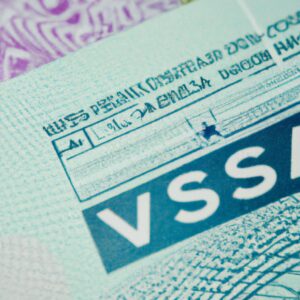
What is a Schengen Visa?
A Schengen visa is a type of visa that grants you access to enter 26 countries in Europe. These countries – known as the Schengen Area – have agreed to allow travelers to move freely within their borders. With a single Schengen visa, you can enter any of the participating countries for up to 90 days in a period of 180 days.
While the most common use of the Schengen visa is for leisure travel, it is also available for study, work and other purposes such as medical treatment or business meetings. It is important to note that a Schengen visa does not guarantee entry into the country or countries you intend to visit. That decision is always left to the immigration authorities.
Where is the Schengen Visa Accepted?
The Schengen Area includes 26 countries in Europe, including Austria, Belgium, Czech Republic, Denmark, Estonia, Finland, France, Germany, Greece, Hungary, Iceland, Italy, Latvia, Liechtenstein, Lithuania, Luxembourg, Malta, Netherlands, Norway, Poland, Portugal, Slovakia, Slovenia, Spain, Sweden and Switzerland.
- Countries outside of Europe can also participate in the Schengen agreement. This includes Monaco, San Marino and the Vatican City.
- It is possible to apply for a Schengen visa from any Schengen country, regardless of your point of origin.
- Travelers must ensure that their Schengen visa covers all of the countries they intend to visit.
What is a Schengen Visa?
A Schengen Visa is a travel document that allows people to enter, stay and travel within the Schengen area for up to 90 days. The Schengen area is a group of 26 European countries, which have agreed to open their borders to each other. This allows people to travel freely between them under the same visa terms. The Schengen member states include Austria, Belgium, Czech Republic, Denmark, Estonia, Finland, France, Germany, Greece, Hungary, Iceland, Italy, Latvia, Liechtenstein, Lithuania, Luxembourg, Malta, Netherlands, Norway, Poland, Portugal, Slovakia, Slovenia, Spain, Sweden and Switzerland.
This type of visa is ideal for short-term trips such as visiting friends, attending a business conference or even taking a leisurely holiday in Europe. It is also possible to extend the visa for a longer duration, as long as you meet the necessary criteria.
Eligibility Requirements
In order to be eligible for a Schengen visa, you must meet certain criteria. The most important is that you must have a valid passport from your home country. Your passport must be valid for the entirety of your travel period, and you may need to provide additional documents depending on the type of Schengen visa you are applying for.
In certain cases, you may also need to provide proof of sufficient funds such as bank statements or a recent payslip. You will need to demonstrate that you have enough money to cover your accommodation, transport and other expenses during your travels in the Schengen area.
If you are not a citizen of a Schengen member state, your purpose of travel must also be documented. This could include evidence of an invitation letter from family or friends, or proof of work, study or volunteer opportunities.
Eligibility Requirements For a Schengen Visa
Getting a Schengen visa is not as intimidating as it may seem. It is an easy process, as long as you meet the eligibility requirements. According to the guidelines set by the Schengen Agreement, these requirements are:
- You must be a citizen of a country that is a member of the Schengen Area.
- You must have a valid passport or travel document.
- You must have sufficient funds for the duration of the trip.
- You must have adequate health insurance coverage.
- You must have an invitation letter, if applicable.
- You must provide proof of accommodation and/or transportation.
- You must have a return ticket or onward travel ticket (if applicable).
- You must provide evidence of your intent for the stay.
Additional requirements may be necessary, depending on the purpose of the visit. The Schengen visa application process will provide more detail regarding additional criteria.
Schengen Visa Application Process
Obtaining a Schengen visa can seem daunting, however it’s quite simple if you follow the steps. The application process for a Schengen visa can be broken down into three main parts – understanding your eligibility, completing the application form and submitting the necessary documents.
1. Understanding Your Eligibility
The first step is to check whether or not you are eligible for a Schengen visa. In order to be eligible, you must fulfil certain criteria. For most applicants, this will including providing evidence that you have:
- A valid passport or other travel documents
- Sufficient funds to cover the duration of your stay
- Travel/medical insurance
2. Completing the Application Form
Once you have checked that you meet the eligibility requirements, you can begin to complete the application form. All Schengen visa applications must be completed online, and you may be required to attend an interview at the consulate or embassy where you have applied (depending on your individual circumstances).
3. Submitting Documents
The final step in the application process is to submit the required documents. These include:
- A valid passport or travel document
- Two recent photographs
- Proof of accommodation
- Travel itinerary
- Proof of travel/medical insurance
- Any other relevant documents related to your purpose of travel
It’s important to note that all documents must be originals or certified copies. Once you have submitted all of the required documents, your application will be reviewed and a decision made on your visa status.
Schengen Visa Application Process
The Schengen visa application process is straightforward, and there are several documents required to make it a successful one. The most important part of the application process is to ensure that applicants get all the necessary documents together before they submit them for consideration by the relevant authorities.
To apply for a Schengen Visa, applicants will need:
- A fully completed and signed visa application form.
- The applicant’s valid passport or another travel document accepted by the EU.
- 2 recent color photographs meeting requirements.
- Proof of adequate financial means.
- Travel medical insurance covering the entire Schengen area.
- Proof of accommodation.
- Proof of payment of the visa fee.
In addition to the above documents, applicants may also have to provide further evidence to prove the purpose of their trip. This could include an invitation letter from host family or friends in the Schengen country, tickets for return or onward travel, documents related to studies or work, bank statements, letters from employers and much more.
After all the documents have been collected successfully, the next step is to submit them to the corresponding embassy or consulate.
Planning Your European Trip
When planning a trip to Europe, it is important to understand the Schengen visa and its requirements for travel within the region. A Schengen Visa is a permit that allows you to move freely between 26 European countries which have signed an agreement, known as the Schengen Agreement. With this visa, one can enter the Schengen Area, stay for up to 90 days within a period of 180 days, and leave when they please.
Before submitting a Schengen visa application, travelers must ensure that they are registered for every single trip they make, including entering and exiting countries in the Schengen Zone. If a traveler fails to do so, they may be subject to serious penalties and fines.
Travelers should also keep in mind that any changes made to an application or to the planned trip should be reported to the relevant embassy or consular authority, failing to do so could result in the cancellation of the visa.
Planning Your European Trip
Planning a trip to one of the member states of the European Schengen Area requires travellers to go through an extra step compared to other European countries. Knowing the regulations and having the correct documentation in place before departing, will facilitate a smooth entry into Europe.
The primary thing that travelers should be aware of is registering their trip with the Schengen authorities. Travelers are required to provide exact details of their itinerary and contact details upon entering the Schengen Zone. It is important that any changes to the planned schedule resulting from cancelled flights, late arrivals or early departures, must be registered with the relevant immigration authorities. Failure to do so can lead to fines, prevent entry or cause headaches when attempting to exit the Schengen Area.
In addition to providing details of your trip, it is also essential to ensure that you have the correct visa, if required, and that it is valid for the duration of your stay. Double-check the expiry date and whether your visa allows multiple entries, as this is important when travelling to and from the Schengen Zone.
Those planning a longer stay in the Schengen Area should take into account the travel period permitted for visas and extensions. The visa validity varies for each citizen, depending on the country applied in. Also, keep in mind that visitors from some countries need to apply for a visa before they enter the Schengen Area.
It is important to note that the Schengen Area operates like a single country for international travel purposes and the border control procedure is the same regardless of where you enter or exit the Zone. The fact that you are travelling through the Schengen Area for a few days, rather than residing in one of the member countries, may also affect the type of visa you require. Make sure you are aware of the rules and regulations prior to departure.
Schengen Travel Insurance Requirements
When travelling within the Schengen Zone, travellers are required to have valid travel insurance that covers them throughout their stay. This is essential as it ensures that any medical expenses incurred during your trip are covered. It’s also important to note that the insurance must cover the entire duration of your stay in the Schengen area and can’t just cover a portion of it.
When selecting a travel insurance plan, there are certain criteria that should be taken into consideration. Firstly, your insurance should include coverage for medical expenses, repatriation costs, emergency ambulance services and medications, among other things. Secondly, the coverage should also include personal liability protection, which will provide financial protection in case you are found liable for an accident or injury caused to another person. Lastly, the coverage should extend to all the countries you will visit during your stay.
It is also beneficial to look for travel insurance policies that offer coverage in cases of unexpected events such as natural disasters or civil unrest. In these situations, it is important to ensure that the policy covers any additional expenses incurred due to the event. Additionally, it is important to ensure that the insurance policy offers coverage in case of theft or damage to your personal belongings.
When applying for a Schengen visa, applicants are typically required to attach a copy of their travel insurance documents with the application. It is important to check with the local embassy or consulate for specific requirements. Many embassies also require that your insurance policy has an English translation along with a description of the terms of coverage.
Schengen Travel Insurance Requirements
As part of the application process, when entering the Schengen Area, it is necessary to obtain health and travel insurance. This insurance must be valid in all 26 Schengen countries – this list includes Austria, Belgium, Czech Republic, France, Germany etc. It is important that travelers consider their insurance carefully, as a valid policy is required for visa issuance.
The coverage period of the insurance plan should match the intended period of stay in the Schengen region. The minimum coverage required is €30,000 and the insurance should cover medical treatment, repatriation for medical reasons, and the cost of an emergency return to the traveller’s home country.
Travelers are also advised to purchase additional insurance for any baggage or personal items. This should provide protection in the event of the traveller falling victim to theft, fire or damage whilst travelling in Europe.
Travel Documentation Required
When travelling to the Schengen region, a valid passport is essential. All travellers must have a passport that is valid up to three months after the intended date of departure from the Schengen Zone. Furthermore, it is recommended that the passport has two blank pages available for any visa stamps that may be required.
In addition to a valid travel document, in most cases a Schengen visa will also be required. A Schengen visa is issued by the relevant authorities of the Schengen country in which you plan to stay the longest. Depending on the reasons for the trip, additional supporting documentation may be needed such as bank statements, proof of accommodation, travel itineraries, and proof of medical insurance.
For those under the age of 18, a birth certificate or an official document must be presented if travelling unaccompanied. The same document may be requested for adults travelling with minors.
Travel Documentation Required
All travelers wishing to enter the Schengen Zone must have a valid passport or travel document that will be valid for at least three months after their planned departure from the Schengen zone. In addition, travelers may need to present other documents such as valid identification cards, visas, proof of age, proof of employment or school enrollment, and proof of sufficient funds.
Proof of onward or return travel in the form of valid tickets for flights, trains, buses, and boats or other forms of transportation will be required when entering a Schengen country. Additionally, depending on the traveler’s country of origin, an airport transit visa may be necessary if they are passing through the international zone of a Schengen airport.
Proof of accommodation or arrangements for where you will stay while traveling will also be required. Hotel reservations, rental agreements, or other documents showing the address where you will be staying should be presented on request by immigration authorities.
Staying within the Schengen Zone
When you enter the Schengen Area, you are allowed to remain in the Schengen countries for a maximum period of 90 days within any 180-day period. This means that you will need to consider the number of days you intend to stay in the Schengen region when planning your trip, as overstaying your visa is against the law and could result in fines and other serious consequences.
It is important for visitors to be aware that the 90-day time period does not always apply from the date your visa was issued or when you first entered the Schengen Zone. The 90-day period begins from the first day you set foot in the Schengen region. Make sure you count the days carefully to avoid problems.
Staying within the Schengen Zone
The Schengen Visa enables you to travel and stay in all Schengen countries for a maximum period of 90 days within any 180 day period. It is important to plan your visit so that you do not exceed this timeframe, as you will then be subject to fines or may be required to leave the Schengen region immediately.
If you decide to overstay your visa, then you are likely to face an immediate deportation from the Schengen countries, as well as a ban from entering the region for a certain period. In serious cases, you may also be liable for criminal charges. It is therefore essential to plan your trip and adhere to the permitted visa duration.
Crossing Borders
When planning a trip within the Schengen region, many travellers may need to cross borders between the different countries. This is allowed with extra considerations and regulations. On crossing a border, one must declare their presence to the respective authorities. Additional documents (such as passport and visa) will be requested for verification purposes. It is also important to keep any visa validations on your person at all times.
Travellers may face delays in crossing the border if they do not meet the criteria or have the correct documentation. Travelling between Schengen countries involves strict immigration processes as a way of ensuring the safety of those travelling within the region.
As a Schengen visa holder, you are responsible for respecting the local laws and regulations of the country you are visiting. You must adhere to laws and any customs and practices particular to the place of travel.
Crossing Borders
Travelling between Schengen countries is normally quick and simple. To cross a Schengen border, visa holders should always have their passport or ID card with them. Depending on the country, national ID cards issued to citizens may also be accepted. Passport stamps from each Schengen country visited are important for keeping track of the permitted period of stay in the region.
When crossing a Schengen border, travellers may need to show a valid visa, travel documents such as tickets, and a valid travel insurance policy. Travellers may also be asked to provide additional information regarding their destination and purpose of visit.
Other Considerations
When travelling to a Schengen Zone country, it is important to remember that there are certain laws and regulations that must be followed while visiting. Depending on the length of stay and the country you visit, different regulations may apply.
It is also important to remember that each Schengen member state has its own unique visa requirements. If you plan to visit multiple countries, ensure you have the correct visas before travelling.
As a visa holder, it is your responsibility to abide by the laws and customs of the country that is being visited. This includes but is not limited to; respecting cultural norms, paying any taxes due and respecting the rights of other citizens.
In some cases, visitors are required to register with local authorities or police when entering and/or exiting the Schengen Area. Ensure you are aware of any such requirements for the country you are visiting.
Responsibility of Visa Holders
If you possess a Schengen visa, you must adhere to the laws and regulations applicable in the countries you visit. In addition to following the instructions given on the visa, it is your responsibility to familiarize yourself with the culture and customs of the country and refrain from breaking any of their laws.
The host country can reject entry for holders of a valid Schengen visa should they believe that the traveler may cause them harm or disrupt public order. It is important to always be aware of your responsibilities as a traveler and uphold the law wherever you go. You should also always abide by the terms and conditions outlined on your visa.
If you find yourself in a situation that requires legal assistance, contact your embassy or consulate. They are there to help you with any issues you may have.
Extension Regulations
When traveling in the Schengen Zone, it is important to know the rules regarding extensions. In certain circumstances, some visa holders may be able to extend their stay in the Schengen Zone. This process requires submitting an application to the respective consulate or embassy. Factors such as the length of the prior authorized stay and the reason for the extension all need to be taken into account.
In order to successfully extend a visa, the applicant must prove that there are no grounds for refusal listed in the Schengen visa code. This includes being able to provide proof of sufficient funds to cover the entire stay, proof of accommodation in the respective country, and valid medical insurance.
Moreover, depending on the applicant’s purpose of stay, they may need to provide additional documents. These can include a job contract or an invitation letter from someone residing in the country.
Extension Regulations
If you need to stay longer in the Schengen Zone than the duration of your visa allows, you may be eligible to apply for an extension. There are a few criteria that must be met in order to be eligible for a Schengen visa extension.
First, you must demonstrate the reason for extending your stay. This could include medical reasons or personal circumstances such as attending a funeral. You must also provide evidence that you are able to finance your extended stay, such as financial statements and proof of income.
Finally, you must have a valid passport, and be able to provide proof that you have not overstayed the original visa duration. If all of these requirements are met, you may be granted an extension of your Schengen visa.
Obtaining a Renewal
When the validity period of a Schengen visa is due to expire, you may need to obtain a renewal. To do so, you must contact your local consulate or embassy and complete the relevant forms. Depending on your nationality and circumstances, they may require you to provide additional documentation.
In order to be eligible for a visa renewal, you must demonstrate that you have not violated any of the terms of your original visa, and that you still meet the conditions for entry into the Schengen area. The consulate or embassy will also take into account your personal and financial situation as well as your travel plans.
Upon submission of your documents, an interview may be required. During this interview, you are expected to demonstrate why you should receive a visa extension and why you plan to stay in a Schengen country beyond the original visa period. If your initial request is denied, a visa renewal may not be possible and you will need to leave the Schengen Zone before the expiration date of your visa.
Obtaining a Renewal
Travellers may be able to apply for a renewal of their Schengen visa if they wish to stay longer in the Schengen area than is covered by their initial visa. The process for obtaining a renewal begins with submitting an application at least 15 days before the current visa expires.
If successful, the visa holder will receive a new visa that may grant another 3 months of travel within the Schengen area. To ensure they are eligible for a visa renewal they must have a valid reason for continuing to remain in the Schengen region. This can include; remaining with family or friends, lengthy work projects or completing educational courses.
When renewing a Schengen visa, travellers must re-submit all the documents that were provided in the original application, including proof of income, travel itinerary and a valid passport. They must also pay the relevant visa fee and provide a completed visa renewal form.
Conclusion
Schengen visas are an invaluable tool for allowing citizens from non-EU countries to travel in the Schengen Zone. While applying for a visa and travelling within the Schengen area has a number of requirements and obligations, understanding them before you go can make your trip much smoother.
To summarise, applicants must meet all the eligibility criteria, fill out all the required forms and submit the required documents before Applying for a Schengen Visa. They must also create an itinerary that allows them to remain within their permitted stay in the Schengen Area. Furthermore, applicants need to make sure they are prepared with the proper travel insurance and the necessary travel documents to cross Schengen borders. Lastly, they must remember to behave responsibly and obey all local laws and regulations.
We hope this guide has made the application and travel process simpler for you. For additional information, the EU Council hosts a website dedicated to Schengen Visas which can be found here: https://www.consilium.europa.eu/en/policies/visa-policy/.
We wish you safe and happy travels!
The Schengen Visa is an essential document that enables citizens of certain countries to travel freely across the Schengen area. It is accepted in 26 European countries, including most of the EU members as well as Iceland, Norway, and Switzerland. The visa allows travelers to enter the entire Schengen region for a stay of up to 90 days within a six-month period.
To get a Schengen visa, visitors must meet a few eligibility requirements. First, travelers must be from one of the eligible countries listed on the Schengen Visa website. Additionally, they must possess a valid passport with at least two blank pages. Visas are also subject to entry and exit restrictions, including the need to register a trip in the Schengen countries before visiting them.
Applying for a Schengen Visa is relatively straightforward. Applicants must have their valid passport, a completed application form with recent photographs, proof of travel insurance, proof of payment of the visa fee, and other documents as applicable. Depending on the purpose of the visit, some additional documents may be required such as bank statements, flight tickets, hotel reservations, etc.
Before traveling to the Schengen area, it is important to plan the trip accordingly. Fraudulent entries and unauthorized stays should be avoided as they can lead to serious legal repercussions. All trips must be registered in the Schengen countries prior to entering them.
Travel insurance is mandatory when visiting the Schengen countries. Visitors must have health insurance covering all medical expenses, repatriation for medical reasons, emergency hospital treatment, and death in case of an accident or illness. Additionally, all travelers should be covered for personal liability and accidents.
To enter and transit the Schengen Zone, travelers must have a valid passport, visa, and other necessary documents such as an invitation letter from the employer, school, or host. They must also evaluate any specific visa regulations in the country they are visiting.
Staying within the Schengen Zone is permitted for up to 90 days within a six-month period. Overstaying the visa is a serious offense and can lead to legal penalties and deportation.
Crossing borders between Schengen countries is relatively easy, although travelers should check the visa requirements for each country. For example, some countries require travelers to obtain a multiple-entry visa if they wish to cross their borders multiple times during their visit.
Visitors should also be aware of their responsibilities while traveling to the Schengen Region. This includes respecting local laws, avoiding any criminal activities, and maintaining proper documentation.
In some cases, visitors may need to extend their visa. To do so, they must meet the criteria set forth by the Schengen countries, such as providing proof of employment or study. In order to apply for a renewal, applicants must complete the extension application form and submit all necessary documents.
This guide has provided an overview of what a Schengen Visa is and the various criteria related to obtaining it. Further questions and concerns can be addressed through the Schengen Visa website or by contacting the relevant embassy or consulate.
comments: 0








